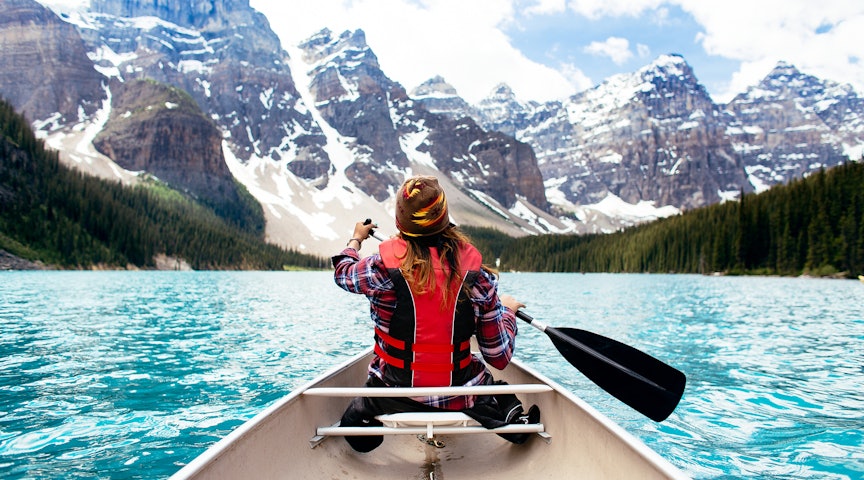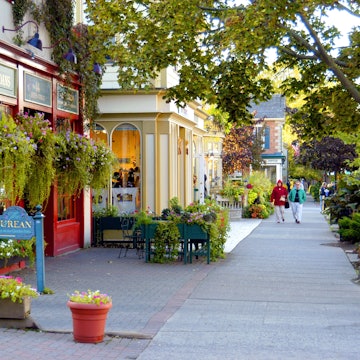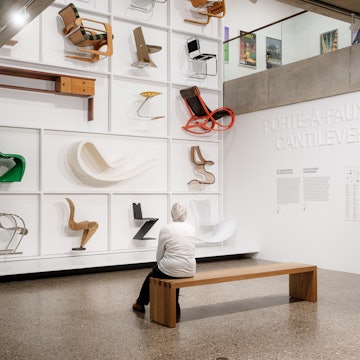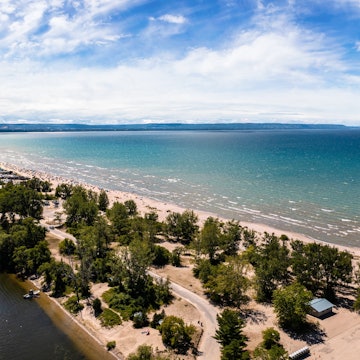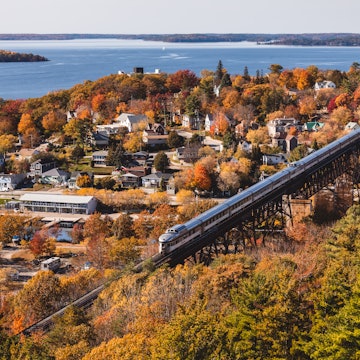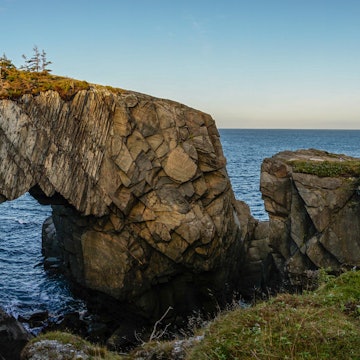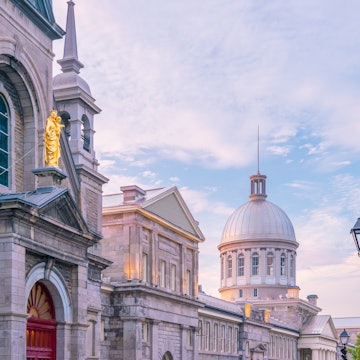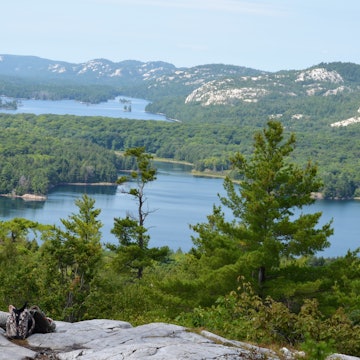
The wild east: adventures in Québec’s backyard
Sponsored by

Sep 13, 2019 • 6 min read

Canoeing the calm waters of Lac-du-Fou in Mauricie National Park, Québec © Tom Robinson / Lonely Planet
Travel writer Mike MacEacheran stepped into the wilds of Québec just outside of Montréal to see what adventures he could find. Here's what he discovered.

On the shores of Lac Blanc, it’s dinnertime for black bears. A sow and young cub clatter through the maple, snouts down for berries and roots and snorting with a sound like an engine misfiring; tongues click, jaws pop. Golden reeds are threaded with spider webs, and a great blue heron stalks the shallows, casting a shadow onto the glassy-calm water. The air smells of sedge. The forest watches and waits. Ahead, a rough path spools into the darkness and a hulking male comes bounding down, all muscle, teeth and hunger. Within moments, the mother and cub skittishly disappear and the treetops empty out, save for a solitary bald eagle, its head and beak almost indecipherable from the tips of the pines in the inky light of early evening.
Many who have never come to Canada imagine the bears. Few who come are lucky enough to see them still. And yet Québec, the country’s largest province and a frontier-breaking land laced with thousands of lakes and forests, has a habit of delivering lottery moments like this. Almost all accounts of this French-Canadian territory mention the country-within-a-country vibe, the Unesco-worthy treasures, the language and the terroir, the taiga and the tundra — with little comment on its wolf, elk, moose and bear.

It's early August, height of black bear season, and I’m on the boundaries of La Mauricie National Park, a 536 km2 enclave bordering the Saint Lawrence lowlands, a two-hour drive from Montréal. From here, the evergreen belt stretches north before surrendering abruptly to the Hudson Strait ice floes, some 1600km away. In between are rivers that crosshatch the landscape and a tapestry of tiny settlements and outfitters used for fishing and hunting. Here, outsiders breathe from the bottom of their lungs as if they’d forgotten how.
Life on the lakes
My journey begins north of Saint-Didace at a cluster of cabins and a ranch-style encampment turned over to wildlife conservation in a region almost completely enmeshed by forest. Traditionally, visitors would have arrived with buckshot for elk and lines baited for trout, but today most are satisfied with a glimpse of a beaver or bear, or a canoe paddle in the diamond-clear lakes. Like most outfitters, Pourvoirie du Lac Blanc has kayaks and rabaskas (12-person bark canoes originally used by First Nations tribes for trading fur), encouraging visitors to use them at every opportunity. With 664 lakes in the immediate area, and 30,000 farther afield, the Québécois are genetically hardwired to spend days on the water. Indeed, they’re practically a human right.
‘The lakes have created an entire ecosystem for birds, beavers and a thousand more creatures, including us,’ says ranger Maxime Descoteaux, as he lifts his binoculars to watch a pair of black vultures circle. A member of the Atikamekw First Nations (Atikamekw means ‘lake whitefish’), Descoteaux’s culture is inextricably linked to this land of water. He has adopted the lessons of his ancestors into his backwoods expeditions.

‘I can smell the rain coming,’ he says, looking skyward before leading me deeper into the spruce to a deer-skin prospector’s tent, a welcome shelter for the night. The surrounding campground is decorated with elk antlers, feathered dreamcatchers and — after the rain passes — a rumpled top blanket of stars. The air cools and a campfire is lit, and in another lifetime, someone squinting across this haze might have spotted the guide’s elders trading the same tales around similar flames.
La Mauricie National Park from above
Up above the tree line the next morning, as our helicopter catches air, the lakes zoom out and the landscape swells with spectacle. The vast forests and marshes disguise it, but life is hidden in every nook. And to local pilot Georges Pellerin, flying above the green and into the blue, with summer colors bursting through, it represents indescribable freedom.
‘No wind. Light clouds. Perfect weather for flying,’ he says, as we chopper out above a widescreen lake. ‘Only God has a better view.’

The pilot’s sentiment couldn’t ring truer. In no time, the helicopter allows a glimpse of otherwise impassable forests and unreachable lakes, many of which have likely never been paddled or swam in before. Few have names. It takes a while to get used to it all — the tension between risk and beauty while swooping low — but the windshield view of watery basins and rolling bottomlands seems like some small miracle. We buzz north and by the time we land at Sacacomie Lake, 25 kms north near Saint-Alexis-des-Monts, arriving feels like an act of virtue.
Even in a part of Canada as geographically blessed as La Mauricie, Sacacomie Lake commands a special status. This is a corner of Québec where nature has the upper hand and the age-old romance of Canada — the symmetry of bears and beavers, flint-edged mountains and fir trees — springs to life. In Sacacomie Hotel, a multi-tiered log inn hunkered on a steeply-pitched hillside, canoeists return from the shoreline in a mood of celebration for sundowners: maple syrup–blended whisky on the terrace as the sun sets with a flare that gives appearance of the heavens being set ablaze.
The draw of the land
Cruising the lake with boatman and self-confessed wild man Bryce Pillado the next morning, the only thing missing from the picture is an elk or wolf drinking by the water’s edge. Every detail readies itself as if for a photograph. Treetops fill with birds; the forest twists and turns in the breeze; a passing kayaker sifts a paddle towards us as waves gently lap the shore.
‘I never planned to stay this long,’ says Pillado, cutting the engine as we approach a curved sandy beach lined with a handful of canoes. ‘But there’s a spiritual energy here — and that makes it almost impossible to leave.’ Born in Madrid, his obsession with the outdoors has committed him to stay.

We’ve arrived at a camouflaged, timber-framed sugar shack. Tourism may be one of Québec’s most rewarding industries, but many of the old customs remain deep rooted and strong. Maple syrup distilling is one such millennium-old tradition — and in the surrounding thickets are some 13,000 sugar maples, all tapped for their sap. Inside the cabin is a reminder of another life lived. There is a soldered alembic still, all stained steel, a kettle drum and copper faucets. The air is chewy, thick with the smell of woodsmoke and sugar.
Looping back west on the road to Mont Tremblant National Park towards Montreal, the final highlight of my visit is found within Parc Régional des Chutes-Monte-à-Peine-et-des-Dalles at Sainte-Béatrix. The L’Assomption River, marked by three rampaging waterfalls, flows through the park and it creates an east-west trough that undergoes a gradual metamorphosis. A majestic sight and no one to share it with. Only then, do I realize I’ve lost myself entirely.
And that is the essence of this trip: a journey into the heart of Québec, with lakes and forests constantly in your grasp and a sense of always being in the right place. Balance restored, it feels nothing short of a personal awakening.
Make it Happen:
For more information on helping plan an itinerary, visit La Mauricie and Lanaudière.
Mike MacEacheran traveled to Canada with thanks to Bonjour Québec and Destination Canada. Lonely Planet contributors do not accept freebies in exchange for positive coverage.
Sponsored by Bonjour Quebec
As a travel entertainment and inspirational media outlet, we sometimes incorporate brand sponsors into our efforts. This activity is clearly labeled across our platforms.
This story was crafted collaboratively between Bonjour Quebec and Lonely Planet. Both parties provided research and curated content to produce this story. We disclose when information isn’t ours.
With sponsored content, both Lonely Planet and our brand partners have specific responsibilities:
-
Brand partner
Determines the concept, provides briefing, research material, and may provide feedback.
-
Lonely Planet
We provide expertise, firsthand insights, and verify with third-party sources when needed.
Take your Canada trip with Lonely Planet Journeys
Time to book that trip to Canada
Lonely Planet Journeys takes you there with fully customizable trips to top destinations–all crafted by our local experts.
